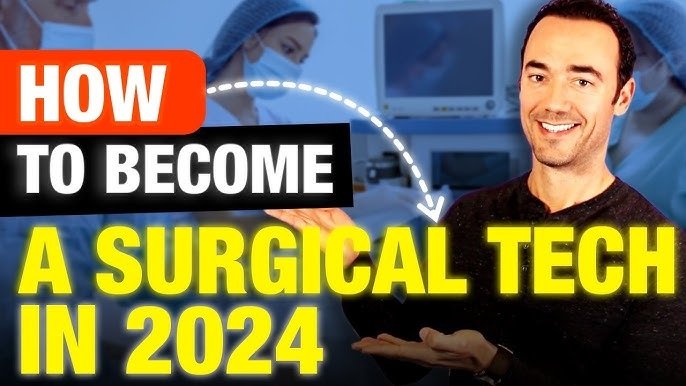If you’re interested in a fast-paced, rewarding career in the medical field that plays a critical role in surgeries, becoming a surgical tech (also known as a surgical technologist) might be the perfect fit for you. Surgical techs are vital members of the surgical team, assisting surgeons, nurses, and anesthesiologists in the operating room. This guide will walk you through the steps required to pursue this exciting career, including education, certification, and job prospects.
What Does a Surgical Tech Do?
Before diving into the steps to become a surgical tech, it’s important to understand the role and responsibilities of the profession. Surgical techs are responsible for:
- Preparing the operating room by setting up surgical instruments, equipment, and sterile supplies.
- Sterilizing and ensuring the cleanliness of all tools and surfaces.
- Assisting the surgical team by passing instruments during surgery and anticipating the needs of the surgeon.
- Maintaining a sterile environment to prevent infections.
- Handling specimens taken during surgery for laboratory analysis.
- Caring for patients before and after surgery by preparing them and ensuring their safety during the procedure.
Surgical techs are a crucial part of the operating team, and their attention to detail can impact the success of surgeries.
Step 1: Complete Your High School Education
The first step to becoming a surgical tech is to earn a high school diploma or a GED. While in high school, it’s beneficial to focus on science and health-related courses such as biology, chemistry, and anatomy. These subjects will help you build a foundation of knowledge that will be useful as you progress in your surgical tech education.
Helpful High School Courses:
- Biology
- Chemistry
- Anatomy and Physiology
- Health Science
- Medical Terminology
Step 2: Enroll in an Accredited Surgical Tech Program
After completing high school, the next step is to enroll in an accredited surgical technology program. These programs are typically offered by community colleges, technical schools, and vocational institutes. The program will provide you with the technical knowledge and hands-on training you need to succeed as a surgical tech.
Program Length and Structure:
Most surgical tech programs take 12 to 24 months to complete and result in either a certificate or an associate degree in surgical technology. Programs generally include both classroom instruction and clinical experience. Courses may cover:
- Surgical procedures
- Medical ethics
- Patient care
- Sterile techniques
- Anatomy and physiology
- Operating room equipment
Accreditation Matters
It’s crucial to choose a program accredited by the Commission on Accreditation of Allied Health Education Programs (CAAHEP) or the Accrediting Bureau of Health Education Schools (ABHES). Graduating from an accredited program ensures you are eligible to sit for certification exams and provides you with a high-quality education.
Step 3: Gain Hands-On Experience Through Clinical Training
During your surgical tech program, you’ll be required to complete clinical training in a real-world operating room environment. This hands-on experience is invaluable, as it gives you the opportunity to apply the skills you’ve learned in class and get comfortable working alongside surgeons, nurses, and other medical professionals.
Clinical rotations often take place in hospitals or surgical centers, and they expose you to various surgical procedures and specialties, such as general surgery, orthopedics, or cardiovascular surgery. You’ll learn how to properly assist during surgeries, maintain sterile fields, and anticipate the needs of the surgical team.
Step 4: Obtain Certification (Optional but Recommended)
While certification is not always required to work as a surgical tech, it is highly recommended. Certification enhances your job prospects and shows potential employers that you are competent and qualified. Two of the most recognized certifications for surgical techs are:
1. Certified Surgical Technologist (CST)
Offered by the National Board of Surgical Technology and Surgical Assisting (NBSTSA), the CST is one of the most widely recognized certifications. To qualify, you must graduate from an accredited surgical tech program and pass the CST exam. The exam covers topics such as:
- Preoperative, intraoperative, and postoperative care
- Surgical procedures
- Anatomy and physiology
- Medical ethics and law
2. Tech in Surgery-Certified (TS-C)
This certification is offered by the National Center for Competency Testing (NCCT). You can qualify to take the TS-C exam by graduating from an accredited program or gaining sufficient work experience. The exam covers surgical procedures, patient care, and sterile techniques.
Continuing Education Requirements
Both certifications require continuing education to maintain your credentials. The CST, for example, requires 60 hours of continuing education every four years, while the TS-C requires renewal through continuing education every five years.
Step 5: Apply for Surgical Tech Positions
Once you’ve completed your education and obtained certification, it’s time to start applying for jobs as a surgical tech. You can work in a variety of healthcare settings, including:
- Hospitals
- Ambulatory surgery centers
- Outpatient care facilities
- Specialized surgical units (e.g., orthopedics, cardiology)
Surgical techs are in high demand due to the need for skilled professionals in operating rooms. According to the U.S. Bureau of Labor Statistics (BLS), employment of surgical technologists is projected to grow 6% from 2021 to 2031, faster than the average for most occupations.
Job Search Tips:
- Prepare a resume that highlights your education, certification, and clinical experience.
- Network with professionals you’ve met during your clinical rotations.
- Apply to a variety of healthcare facilities, including large hospitals and smaller surgical centers.
- Tailor your cover letter to each employer, emphasizing your skills and enthusiasm for working in surgery.
Step 6: Consider Specialization or Further Education
As you gain experience as a surgical tech, you may want to specialize in a specific area of surgery, such as neurosurgery, orthopedics, or cardiovascular surgery. Specializing can increase your earning potential and make you a sought-after expert in your field.
Alternatively, some surgical techs choose to advance their careers by pursuing further education, such as becoming a surgical first assistant or transitioning into nursing or healthcare administration.
Skills and Qualities Needed to Succeed as a Surgical Tech
To excel as a surgical tech, certain skills and qualities are essential. This career requires more than just technical knowledge—it also demands a high level of attention to detail, quick thinking, and a calm demeanor in high-pressure situations. Here are some of the key skills needed:
- Attention to detail: Surgical techs must ensure that the operating room is properly set up, instruments are sterile, and that everything is in place to prevent complications.
- Dexterity: You’ll need good hand-eye coordination and fine motor skills when passing instruments or assisting in surgeries.
- Physical stamina: Surgical techs often stand for long periods during surgeries, so physical endurance is important.
- Communication skills: You’ll work closely with surgeons and nurses, so being able to communicate clearly and effectively is crucial.
- Ability to stay calm under pressure: The operating room can be a stressful environment, especially during emergencies, so maintaining composure is key.
Surgical Tech Salary and Job Outlook
Surgical techs enjoy competitive salaries and strong job security due to the growing demand for healthcare professionals. According to the BLS, the median annual salary for surgical technologists was $49,710 in 2021, with top earners making over $75,000. Your salary can vary depending on factors such as location, experience, and the type of healthcare facility where you work.
The job outlook for How to Become a Surgical Tech is promising, with an expected growth rate of 6%, which is faster than the average for all occupations. This growth is driven by advances in medical technology and an aging population that requires more surgical procedures.
Conclusion: Becoming a Surgical Tech
Becoming a surgical tech is an excellent choice for individuals who are passionate about healthcare and want to be directly involved in life-saving surgeries. It’s a career that offers job stability, competitive pay, and the opportunity to make a real difference in patient outcomes.
By following these steps—completing a surgical tech program, gaining hands-on experience, obtaining certification, and applying for jobs—you’ll be well on your way to a rewarding and exciting career in the operating room.
FAQs
- How long does it take to become a surgical tech?
- It typically takes 12 to 24 months to complete a surgical tech program, depending on whether you pursue a certificate or an associate degree.
- Do I need certification to work as a surgical tech?
- Certification is not always required, but it is highly recommended as it can improve your job prospects and salary potential.
- Where can surgical techs work?
- Surgical techs can work in a variety of healthcare settings, including hospitals, ambulatory surgery centers, and outpatient clinics.
- What is the job outlook for surgical techs?
- Employment of surgical technologists is expected to grow by 6% from 2021 to 2031, driven by the increasing need for surgical procedures.
Also, Read About, Innovative Tech Solutions with Verizentech.




